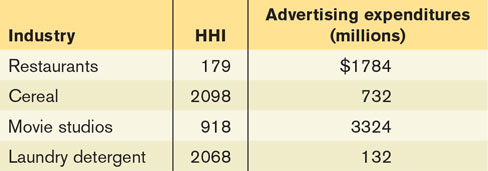15.8 PROBLEMS
Question 15.11
Use the three conditions for monopolistic competition discussed in the chapter to decide which of the following firms are likely to be operating as monopolistic competitors. If they are not monopolistically competitive firms, are they monopolists, oligopolists, or perfectly competitive firms?
A local band that plays for weddings, parties, and so on
Minute Maid, a producer of individual-
serving juice boxes Your local dry cleaner
A farmer who produces soybeans
Question 15.12
You are thinking of setting up a coffee shop. The market structure for coffee shops is monopolistic competition. There are three Second Cup shops and two other coffee shops very much like Second Cup in your town already. In order for you to have some degree of market power, you may want to differentiate your coffee shop. Thinking about the three different ways in which products can be differentiated, explain how you would decide whether you should copy Second Cup or whether you should sell coffee in a completely different way.
Question 15.13
The restaurant business in town is a monopolistically competitive industry in long-
run equilibrium. One restaurant owner asks for your advice. She tells you that, each night, not all tables in her restaurant are full. She also tells you that she would attract more customers if she lowered the prices on her menu and that doing so would lower her average total cost. Should she lower her prices? Draw a diagram showing the demand curve, marginal revenue curve, marginal cost curve, and average total cost curve for this restaurant to explain your advice. Show in your diagram what would happen to the restaurant owner’s profit if she were to lower the price so that she sells the minimum- cost output.
Question 15.14
The market structure of the local gas station industry is monopolistic competition. Suppose that currently each gas station incurs a loss. Draw a diagram for a typical gas station to show this short-
run situation. Then, in a separate diagram, show what will happen to the typical gas station in the long run. Explain your reasoning.
Question 15.15
The local hairdresser industry has the market structure of monopolistic competition. Your hairdresser boasts that he is making a profit and that if he continues to do so, he will be able to retire in five years. Use a diagram to illustrate your hairdresser’s current situation. Do you expect this to last? In a separate diagram, draw what you expect to happen in the long run. Explain your reasoning.
Question 15.16
Magnificent Blooms is a florist in a monopolistically competitive industry. It is a successful operation, producing the quantity that minimizes its average total cost and making a profit. The owner also says that at its current level of output, its marginal cost is above marginal revenue. Illustrate the current situation of Magnificent Blooms in a diagram. Answer the following questions by illustrating with a diagram.
In the short run, could Magnificent Blooms increase its profit?
In the long run, could Magnificent Blooms increase its profit?
Question 15.17
“In the long run, there is no difference between monopolistic competition and perfect competition.” Discuss whether this statement is true, false, or ambiguous with respect to the following criteria.
The price charged to consumers
The average total cost of production
The efficiency of the market outcome
The typical firm’s profit in the long run
Question 15.18
“In both the short run and in the long run, the typical firm in monopolistic competition and a monopolist each make a profit.” Do you agree with this statement? Explain your reasoning.
Question 15.19
The market for clothes has the structure of monopolistic competition. What impact will fewer firms in this industry have on you as a consumer? Address the following issues.
Variety of clothes
Differences in quality of service
Price
Question 15.20
For each of the following situations, decide whether advertising is directly informative about the product or simply an indirect signal of its quality. Explain your reasoning.
Hockey superstar, Hayley Wickenheiser, drinks Gatorade in a TV commercial and claims that she prefers it to any energy drink.
A newspaper ad states, “For sale: 1999 Honda Civic, 250 000 kilometres, new transmission.”
McDonald’s spends millions of dollars on an advertising campaign that proclaims: “I’m lovin’ it.”
Subway advertises one of its sandwiches by claiming that it contains 6 grams of fat and fewer than 300 calories.
Question 15.21
In each of the following cases, explain how the advertisement functions as a signal to a potential buyer. Explain what information the buyer lacks that is being supplied by the advertisement and how the information supplied by the advertisement is likely to affect the buyer’s willingness to buy the good.
“Looking for work. Excellent references from previous employers available.”
“Electronic equipment for sale. All merchandise carries a one-
year, no- questions- asked warranty.” “Car for sale by original owner. All repair and maintenance records available.”
Question 15.22
The accompanying table shows the Herfindahl–
Hirschman Index (HHI) for the restaurant, cereal, movie, and laundry detergent industries as well as the advertising expenditures of the top 10 firms in each industry in 2006. Use the information in the table to answer the following questions. 
Which market structure—
oligopoly or monopolistic competition— best characterizes each of the industries? Based on your answer to part (a), which type of market structure has higher advertising expenditures? Use the characteristics of each market structure to explain why this relationship might exist.
Question 15.23
McDonald’s spends millions of dollars each year on legal protection of its brand name, thereby preventing any unauthorized use of it. Explain what information this conveys to you as a consumer about the quality of McDonald’s products.